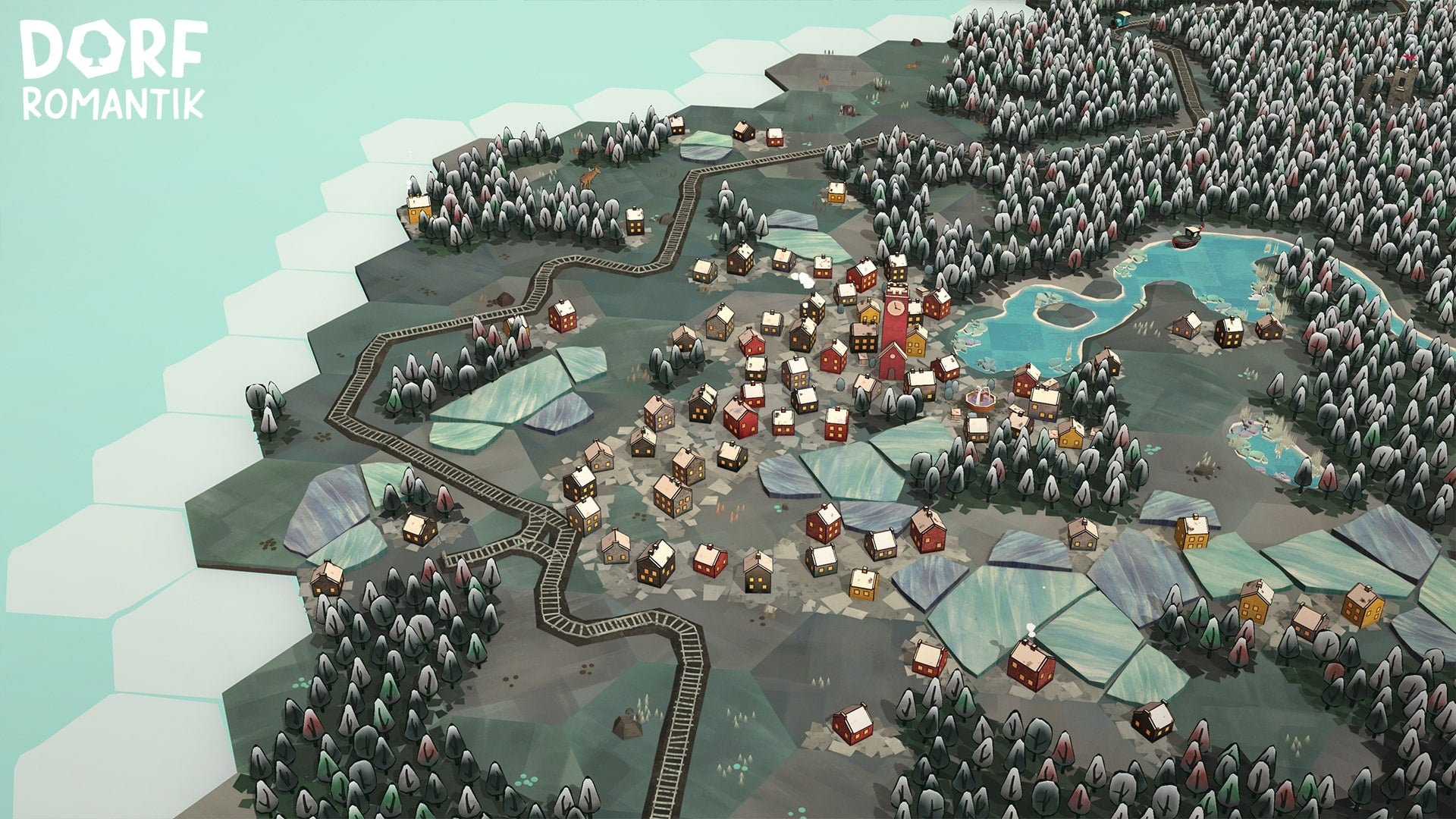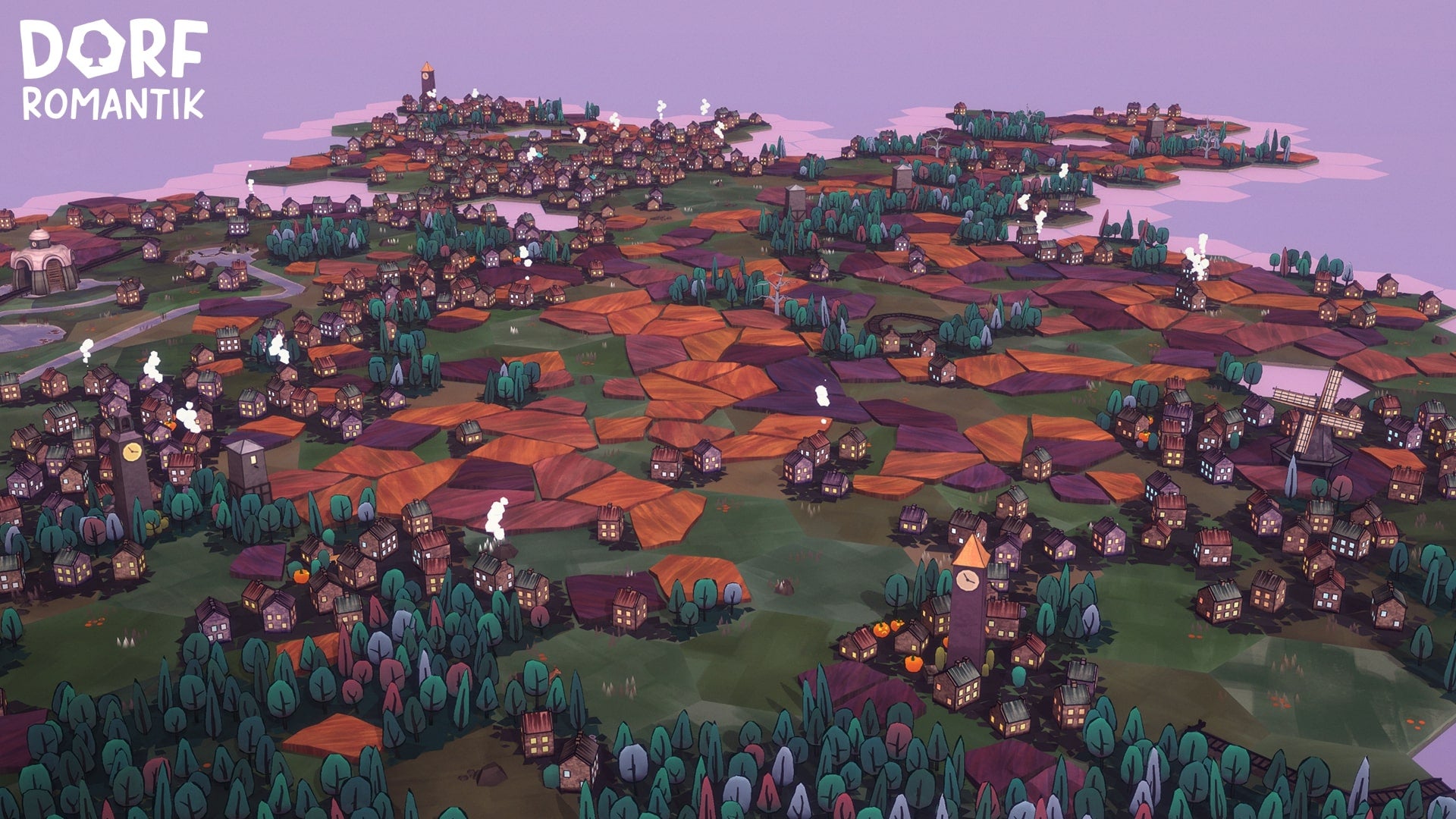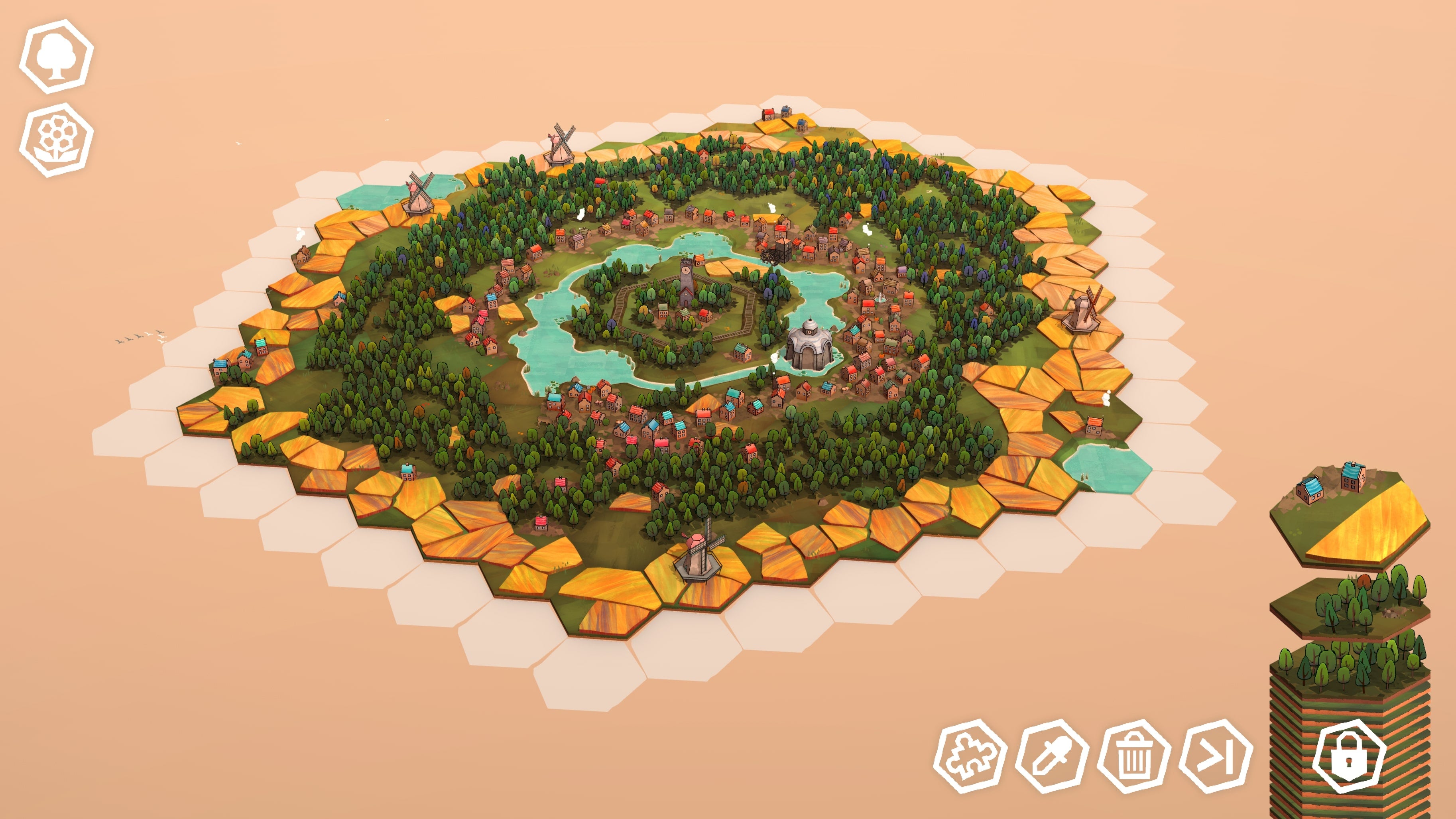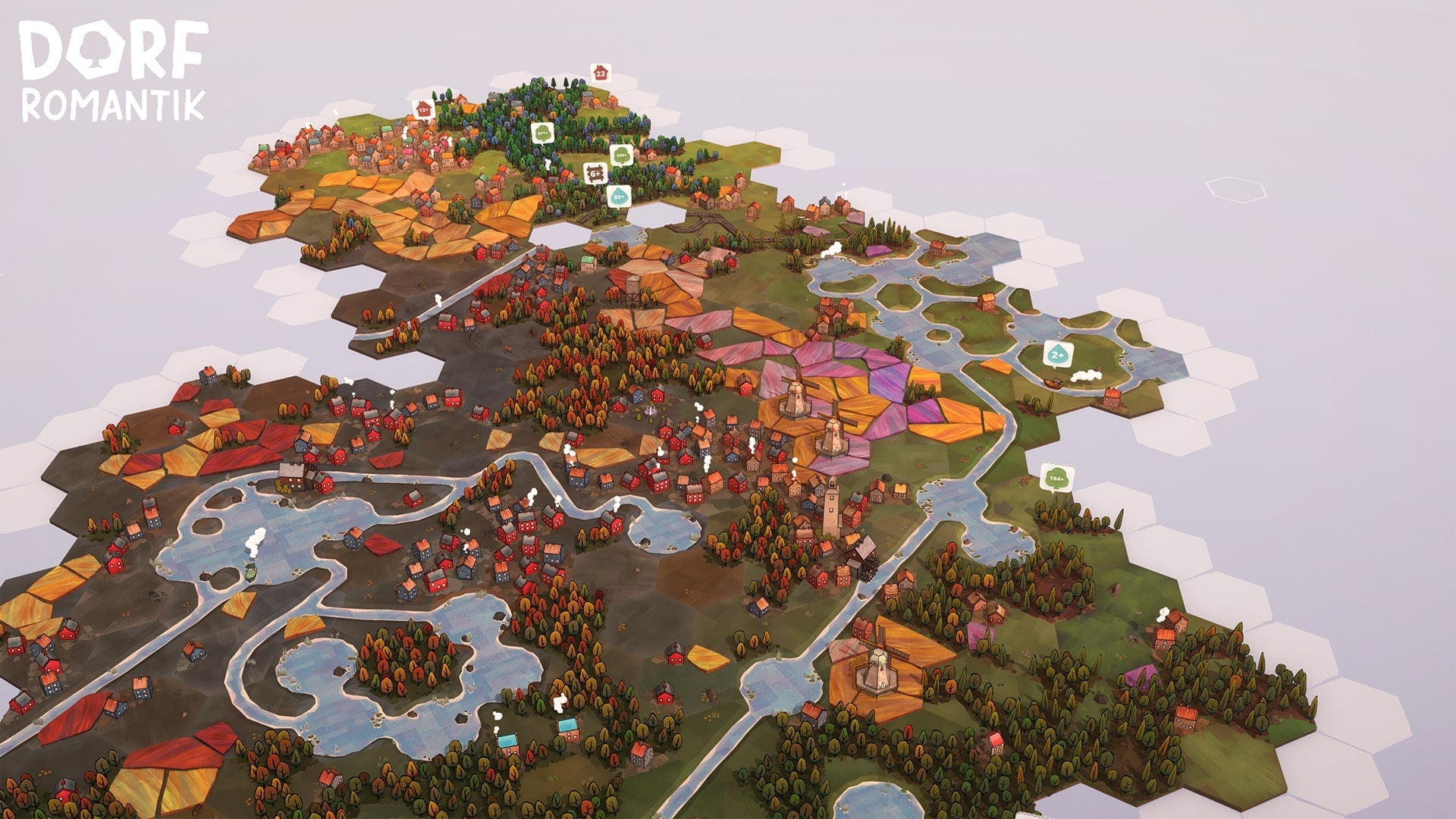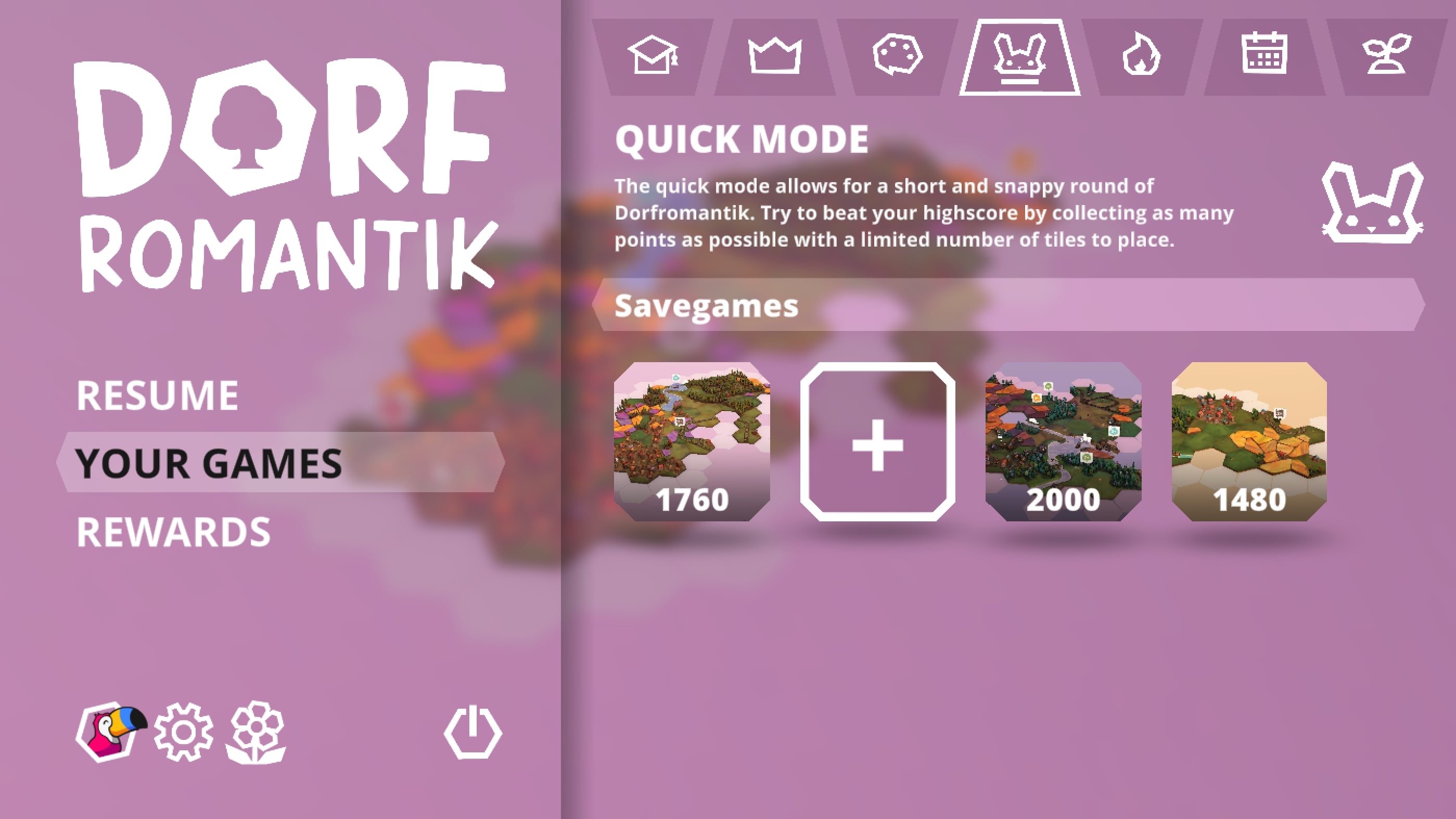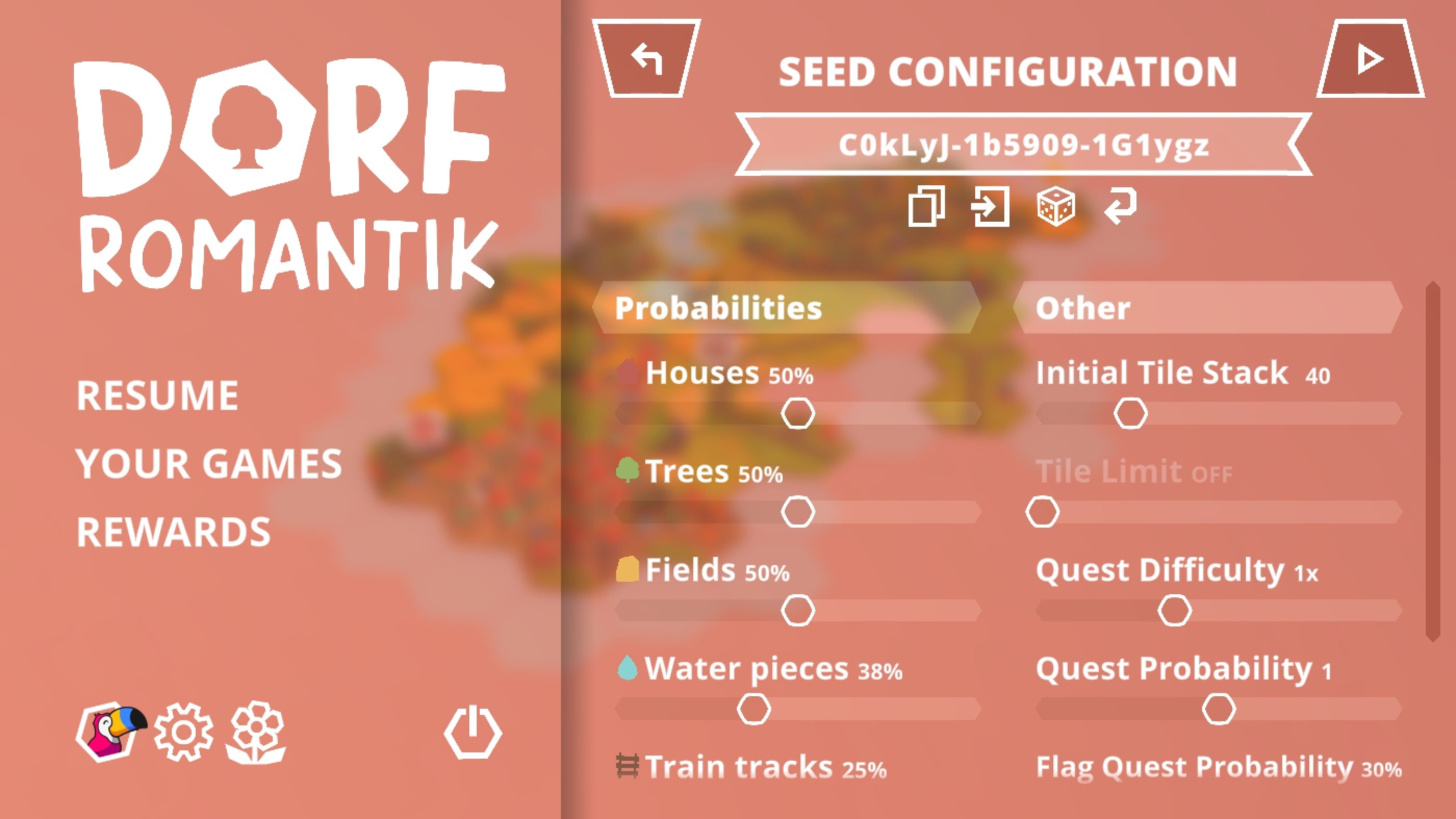Understanding it depends a lot on being German, because that’s where the team, Toukana, is from. Toukana is four people: Timo Falcke, Sandro Heuberger, Luca Langenberg and Zwi Zwausch, and they met doing a game design degree in Berlin. “Dorfromantik” is a German word. “An older word,” Zwi Zausch tells me in a video call they all join me for. “And it’s usually used to describe the kind of nostalgic feeling you get when you long to be in the countryside.” Perfect, isn’t it? The closest word we have in English is bucolic, which sounds like something to do with the plague. The name didn’t stick straight away. They used it as a placeholder because it described the feeling they were going for, and slowly, it grew on them. They liked the idea of using a German name for a German game, though some developer friends advised them against it. English audiences wouldn’t like it, they said. But if English speakers can get used to words like Kindergarten and Zeitgeist, Toukana reasoned, surely Dorfromantik would stand a chance too. So it stuck. And now you know what it means. Dorfromantik, the game, is a tile-laying game where you slowly build a countryside one hexagonal tile at a time. The idea is to match the sides of the tiles so that you connect fields or trees or houses to make larger collections of them - forests and towns and farmland. And it isn’t only done for show: behind it is a points-based score system, which racks up the more pieces you place - pieces that are replenished when fulfilling missions, which require forests of a certain amount of trees, or towns of a certain amount of houses, and so on, in the game. I love Dorfromantik. I wrote at length why in my Dorfromantik review last year. But I also went on to spend most of the summer playing it, and not just me but me and my partner. We’d fire it up in the morning at the weekend and proceed to lose whole days taking it in turns playing it. I say “lose whole days” but that’s not really the right language because what’s lost while in company such as this? Playing Dorfromantik is like lounging back on a pillow in the sunlight, it’s a lovely place to be. It’s been a tremendous success. Exactly how successful, in terms of copies sold, I can’t tell you because the team won’t tell me - they only repeat what sounds like the company line of “we like to say ‘we sold enough that we can continue working as Toukana Interactive”, which turns out to be a very sensible, very them thing to say - but having nearly 13,000 reviews on Steam indicates Dorfromantik has done well. SteamSpy, which is a rough gauge, puts sales somewhere between 200,000 to 500,000 units, in case you’re wondering. But there’s no extravagance here, much to my gossipy disappointment. The most exciting thing they did with the money was to pay themselves a wage - how bourgeois! - and to pay back a loan they took from the state. “Usually, [the] majority of games that they support can’t pay the credit back that they give them,” Timo Falcke tells me. “And we could just do it all at once - the whole credit in one transaction, basically. That was really crazy and really showed us how exceptional the success is.” But otherwise it’s all still sitting there, the money, acting like a kind of safety net for the future of Toukana, which is great, if a little boring. It’s just not what I expected. I expected to meet a group of young students who were giddy with their unexpected success. Maybe one of them had bought a flash new car or something. Maybe one of them had bought a house. But they’re not those people, they’re actually very down to earth, and they’re not particularly young. They’re hardly haggard either - Luca Langenberg and Timo Falcke are 27, and Zwi Zausch and Sandro Heuberger are 30 - but they’re not the just-left-home “students” the label suggests. They came together after the bachelor’s degree especially to do their master’s degree, united under a common aim of not being assimilated into corporate game making, but doing things their way. “If we don’t do it now,” they reasoned, as Zwi Zausch says, “now that we are finished with our bachelor’s degree, we will probably never be in the same situation again in our lives, where all four of us are not necessarily stuck in a routine or in a safe job. So we thought that this right now is the right moment to take the risk and try.” And their Master’s focus: designing and writing about the process of making a game. The question of “which game?” still lingered, and the process of answering it involved making a new prototype every few days until they’d made 10 to choose from. One was a game where you were a small fish in a big sea, one was a movement-focused game, one was action - they were all apparently very different. But one of them stood out, as much for practical reasons as anything else. “The big thing for us,” says Timo Falcke, “was that we had a really clear vision on what Dorfromantik will be in the end … So we had this two-day prototype where we already had the base mechanics implemented, basically. They changed quite a bit since then but the base, the core was there. And for many of the other prototypes, the vision wasn’t as clear.” It’s remarkable how clear the vision was, and you can still see this in the playable Dorfromantik prototype that’s available on Itch.io. The nuts and bolts of the Dorfromantik experience - the look, the vibe, gameplay - it’s all unmistakably there. Perhaps that’s why it works so well: it’s such a succinct design, such a piercingly clear idea it doesn’t need anything else. And the less it needs, the less it needs to explain, making it understandable at a glance. Effortless, really. But there was a side to the game the team couldn’t have known until people played it, really. I mean, they intended it to be relaxing, but it wasn’t until their prototype got swept up in the massive Itch Bundle for Racial Justice and Equality, in the spring of 2020, they realised just how calming it could be. “For me, one of the most touching things I read was from someone who commented very early on, I think even when the game was still in the prototype phase on Itch.io, and this person commented that the game helped them to kind of stay sane and lower their anxiety during the lockdown phase,” says Zwi Zausch. “We actually got quite a lot of these messages,” adds Heuberger. And it was because of them the team decided to do an early access release, because it wasn’t originally part of the plan, but people seemed like they could use the game now. “We are, of course, fully aware that we have a very modest contribution to this crisis in comparison to medical stuff, right, but the fact that we somehow could contribute to this with, um, harmony within our possibilities, was really… Still today I actually get goosebumps to think about it. It’s really touching.” The stars aligned, I suppose. The Itch.io bundle drew huge attention to the game, Steam featured it, and people flocked to play it. Popular German streamers streamed it. Dorfromantik would even go on to win a prestigious German Computer Game Award, attracting German TV interviewers in the process. Sandro Heuberger remembers watching the Discord new members just grow and grow and grow, “like blub blub, blub blub blub blub blub blub blub blub” - that’s the sound of people joining the chat channel I think. “I was like, ‘What?! What’s going on?’ I thought we were being trolled by something. It was so surreal.” “I mean, it’s definitely one of the most intense situations that we had in our lives,” Timo Falcke remembers. They were exhausted from a month of pushing towards the release, and now they pumped full of adrenaline, unable to look away from their screens as notifications rolled in from everywhere. “All the time we had more things to do and to answer and to look at,” he says, and it would last weeks. “We were really happy but also really overwhelmed. At some point, we couldn’t hardly grasp what’s going on.” “Dopamine overflow,” says Sandro Heuberger. A few weeks later they settled, took a breath, hired a community manager to do what they were struggling to, and got back to actually finishing the game. And it’s been a busy year for updates since the April 2021 early access release. There’s been a big new Creative mode added, which does away with the inhibiting score so you can focus solely on the beauty of what you make. There have been new seasonal biomes to vary what you see. There have been balance changes tweaking the underlying formula, not that you’ll probably notice them, but I’m assured it’s now a nicer experience to play. The update they’re particularly fond of, though, is the Undo button. It’s became a bit of a meme within the community, it was so often asked for - though it’s sacrilegious if you ask me. If you make a mistake by rushing a move, that’s on you as far as I’m concerned, as much as I hate it when it happens. But the community desperately wanted it and so, eventually, Toukana acquiesced - and acquiesced in style. The updates haven’t stopped. Today’s release represents probably the biggest update the game has ever had, I’m told. With it comes the ability to customise the rules of the game, and there are three new modes that spin off this. One allows you to copy the exact seed of a generated map so you can attempt the exact same puzzle as a friend to see who does best, which sounds great. Another variation is Quick mode, with a time limit; another is Monthly mode, which rejigs the rules for a new challenge each month; and another is Hard mode, which dishes you out harder tiles. Some people really are that good, apparently - watching people bend the game in ways they never thought was possible is, collectively, something the team really loves. On top of that, there’s a new six-track soundtrack (which means there are now twice as many music tracks in the game), new sound effects and new achievements. There’s a whole usability update, including a user interface overhaul, quality of life improvements, visual feedback - the whole shaboodle. It’s as good a reason as any I’ve heard to go back to the game and play again. Controller support on the other hand: that’s a tricky one. It’s not completely there yet - rudimentary support was added to get the game working on Steam Deck recently - “but will definitely come after the release”, says Tim Falcke. “Yeah, it’s pretty much definitely happening,” Sandro Heuberger adds, reinforcing it. Controller support is also intriguingly linked to the bigger question of what comes next for Toukana. Listen to this: “To be honest we can’t tell you yet but a hint is that we promised to do a better or completed controller support…” Heuberger says. When it dawns on me what he may be saying - to me it sounds like a possible console release - I let out a big “ahhhh” and they smile. But they are being careful to say no more. “This year will definitely still be a good year for Dorfromantik,” adds Falcke. “There are a few things that I think will surprise some people and that are really cool.” He then talks about “the PC version” and I wonder why he’d talk about it like that unless there were other versions in the works. Just as a joke I also suggest a Dorfromantik board game, which could have lovely little tiles to place down, and to my surprise, they all sit there silently, grinning. I tell them this is very suspicious behaviour, to which they laugh and Zwi Zausch replies, “No comment.” “We’re just really happy people,” Heuberger jumps in. “We enjoyed the time with you.” Whatever happens with Dorfromantik now, it’s already been a tremendous success. And if it reaches wider audiences on PC and potentially console, then wonderful. There are few games I’d rather see in everyone’s life. As for what the team will do next, I don’t know and I don’t think they know. There’s still the small matter of their Master’s thesis to hand in after all, and it’s due imminently. Beyond that, there aren’t any concrete plans, but they’re looking forward to getting back to the creative part of a project again, to doing game jams and quick prototypes and letting ideas flow. The best part is: whatever they do next, they’re set up now to make the best of it. With sustainable working practices like six-hour days (which they genuinely stick to, though it bends a bit close to launch), a small team to support and a chunky financial safety net, they’re in an enviable position. Whether or not they manage to repeat the success of Dorfromantik almost doesn’t matter. They achieved what they set out to do, to make games their way, and long may it continue.
